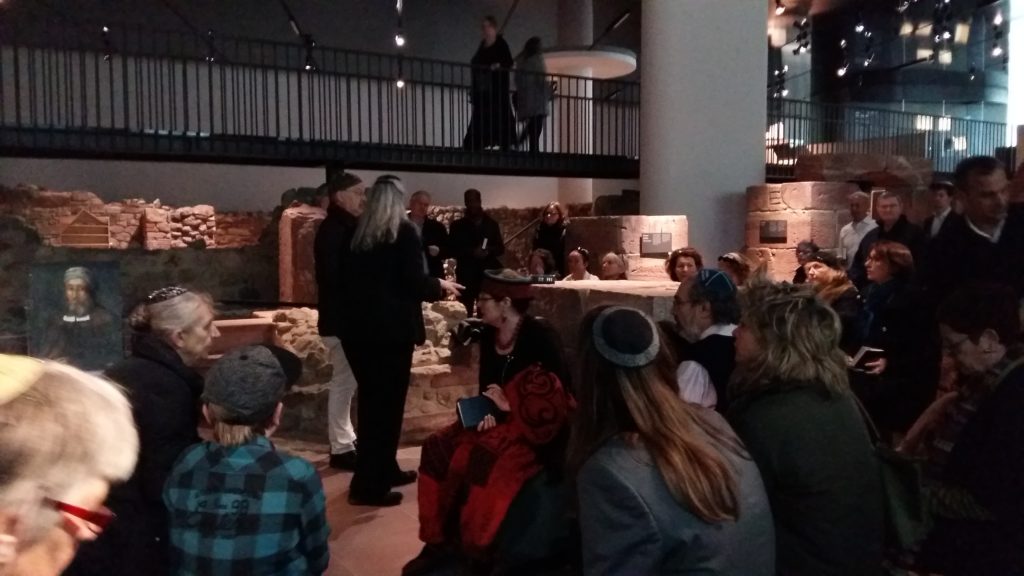A Little Drop of Oil
(An Open Letter of Thanks to the Egalitarian Minyan of Frankfurt-am-Main and the Larger Jewish Community in Germany)
What do you do when your world is destroyed?
As Jews, we know what it is to have worlds destroyed. The world was once destroyed by a flood; the sovereign Jewish nation was split in two and fractured in so many different diasporas, our temple twice demolished; and, Jewish communities throughout Europe were utterly devastated during the Shoah. And yet…
And yet, this weekend I sat in a room – in the old synagogue which is now restored and currently in use – with representatives from various Jewish communities throughout Germany and Europe, where we debated not the question ‘how do Jews find a way to exist again in these places’, but how do so MANY different Jewish viewpoints and communities exist together in these places. This is what I call a “high-class problem”, to be no longer worried about “if we can” but to be concerned about “how we do it now that it is happening (and abundantly)”.
The philosophy, the blueprint, of rebuilding is found in our Torah, written in the Jewish daily prayers, and re-enacted in our festivals. In Genesis the world is created and the Hebrew telling us this story is written in the present tense. There, we see the Adam naming the animals, “creating” its world with each breath. Each morning we thank Hashem for continually renewing the works of creation. At Pesach we eat bitter tears and then walk out from the narrow to the infinite possible, year after year. And, at Chanukah, we light our chanukiah, remembering that it only takes a small bit of oil – even just one drop, we know, from the story of Elisha and the widow – to re-ignite and begin again.
Begin, again.
Shabbat morning, our group had a “Walking Tefilah” – a walking prayer. We took our service onto the streets. Imagine this! A group of Jews, many wearing kippot, walking and singing and saying prayers in public in Frankfurt, Germany! Our path traced various memorial places, literally having us walk on sidewalks set with memorial stones, the names of Jews lost in the Shoah inscribed upon them.
The main part of our service was held at the Jewish Museum, which is built over the remains of the old ghetto of Frankfurt, where you can step down to the old mikvah, and into the remains of houses to read the stories of the past residents, touching and feeling the stones of the walls. Many of the members conducting our service had fought to have this site protected when the city wanted to raze it to build an office complex. There, with them, we said the Shema – all of us, the many of us, from so different communities expressing different ways of being Jews – we said the Shema into, and to, and beyond, these stones, waking them up and bringing them alive again with the now, the rebuilding.
Our final stop was the old market place, where stands today the European Central bank, and where some 70 years before the Jews of Frankfurt were assembled and deported. Walking that path, with statements below our feet etched into the concrete from some of those who had been in that deportation, we stopped and made Kiddush. A sunny day, a group of Jews, making Kiddush in the open public… A group of Jews, Rising Up, literally standing up from on, what was once a destruction.
Many of us experience worlds destroyed when we lose a loved one, fall ill, or are terminated from a job. Worlds are destroyed when relationships fall apart. In these times so often we lose ourselves stumbling in the dark and examining the rubble instead of looking for the bit of oil that remains with which we can re-light the fire to bring in the light. We forget we have the ability to create, to call out into the chaos and name a new reality, to breathe out and begin again.
When I work with couples there is a tendency for my clients to want to go through the list, again and again, of all the wrongs, all the demolished parts. With individual clients the hurt places call out to be revisited. My work is to help them find the drop of oil, to step back into the temple and kindle anew, rather than to walk away. What the community of Frankfurt has shown in this marvelous weekend is how this is done on a communal basis. Ever looking forward and saying “how”, rather than “can’t”.
Futures don’t happen to us, they are made. I’ve had the blessing of also visiting Warsaw, Poland, recently, and seeing vibrant shoots sprouting in every direction from what before seemed barren, gone. Everything can change. Today our eyes are on Syria – that, too, has the possibility of future.
“What do you have in the house,” Elisha asked the widow. What have we have – right now – within us as individuals, as a community, that we aren’t seeing because we are too focused on what it is we don’t have? ‘What do you have’, Elisha asked; ‘What do you see’, the Adam was directed when calling out the names. What do we find when we dare peer deeply into the darkness, into the apparent chaos? What do we have the courage to call out and name as our new creation?
With all my heart I thank the Egalitarian Minyan of Frankfurt-am-Main for this most spectacular European Shabbat, for have the audacity to pray where once it was forbidden, to sing life into the stones that once were forgotten, and for their creative calling out the Pluralistic Jewish Communities in Germany and Europe. You have shown us again what is possible; we are reminded of our blueprint of creating. May you all be blessed, as I have been blessed by being with you.
